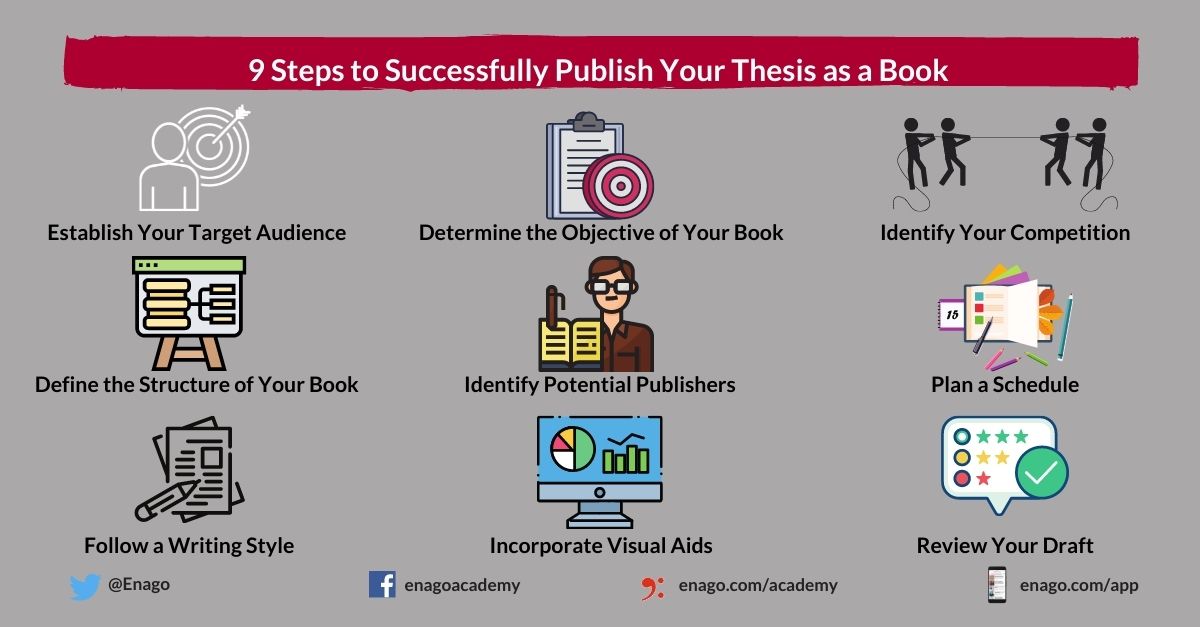9 Effective Tips for Publishing Thesis As a Book

While they may look alike, a thesis is not a book! The process of publishing thesis as a book is different right from its conception to completion. Created with an intent to target a specific audience, a thesis differs from a book in multiple aspects. Although your thesis topic would surely be relevant to your field of study, it perhaps, can be of interest to a wider audience. In such a case, your thesis can be turned into a book.
In this article, we will shed some light on the possible ways of publishing your thesis as a book.
What is the Difference Between a Thesis and a Book?
Researchers spend years working on their thesis. A thesis focuses on the research conducted, and is thus published as journal articles. However, in some cases, it may also be published as a book for a wider readership. While both thesis and book writing require effort, time, and are equally longer versions of documents, they are different in several ways.
- A thesis always begins with a question or hypothesis. On the other hand, a book begins with a series of reflections to grab the reader’s attention. To a certain extent, it could be said that while the thesis starts with a question, the book starts with an answer.
- Another major difference between the two is their audience. The content of a thesis, as well as its format and language is aimed at the academic community. However, since the book is written with an intent to reach out to wider audience, the language and format is simpler for easy comprehension by non-academic readers as well.
- Furthermore, thesis is about documenting or reporting your research activities during doctorate; whereas, a book can be considered as a narrative medium to capture the reader’s attention toward your research and its impact on the society.
How to Turn a Thesis into a Book?
The structure of your thesis will not necessarily be similar to the structure of your book. This is primarily because the readership is different and the approach depends on both the audience as well as the purpose of your book. If the book is intended as a primary reference for a course, take the course syllabus into account to establish the topics to be covered. Perhaps your thesis already covers most of the topics, but you will have to fill in the gaps with existing literature.
Additionally, it may be so that you want your book to be a complementary reference not only for one course, but for several courses with different focuses; in this case, you must consider different interests of your audience.
The layout of most thesis involve cross-references, footnotes, and an extensive final bibliography. While publishing your thesis as a book, eliminate excessive academic jargon and reduce the bibliography to reference books for an ordinary reader.
Key Factors to Consider While Publishing Your Thesis as a Book
- Purpose of the book and the problems it intends to solve
- A proposed title
- The need for your proposed book
- Existing and potential competition
- Index of contents
- Overview of the book
- Summary of each book chapter
- Timeline for completing the book
- Brief description of the audience and the courses it would cover
With all of this in mind, here are 9 steps to successfully turn your thesis into a book.
9 Steps to Successfully Publish Your Thesis as a Book!
1. Establish Your Target Audience
Based on the topic of your thesis, determine the areas that may potentially rise interest in your book’s audience. Once you establish your target audience, figure out the nature of book they would like to read.
2. Determine the Objective of Your Book
Reflect on the scope of your book and the impact it would have on your target audience. Perhaps it can be used as a textbook or supplementary for one or more courses. Visualize what the reach of your book may be; if it is a book with an identified local market, an interest that arose in your educational institution, which can be traced to other similar institutions, or if it can have a national or even international reach.
3. Identify Your Competition
Find out which books are already on the market, what topics they cover, what problems do they solve, etc. Furthermore, ask yourself what would be the advantage of your book over those that already exist.
4. Define the Structure of Your Book
If the book is written as part of a curriculum, use that program to define its structure. If it covers several programs, make a list of topics to focus on individually and sequence them in an order based on educational criteria or interest for the potential reader.
5. Identify Potential Publishers
Search for publishers in your country or on the web and the kind of books they publish to see if there is a growing interest in the book you are planning to develop. Furthermore, you can also look at self-publishing or publishing-on-demand options if you already have a captive audience interested in your work.
6. Plan a Schedule
Based on the structure of your book, schedule your progress and create a work plan. Consider that many topics are already written in your thesis, you will only have to rewrite them and not have to do the research from scratch. Plan your day in such a way that you get enough time to fill in technical or generic gaps if they exist.
7. Follow a Writing Style
The writing style depends on the type of book and your target audience. While academic writing style is preferred in thesis writing, books can be written in simpler ways for easy comprehension. If you have already spoken to an interested publisher, they can help in determining the writing style to follow. If you’re self-publishing, refer to some competitor books to determine the most popular style of writing and follow it.
8. Incorporate Visual Aids
Depending on the subject of your book, there may be various types of visual and graphic aids to accentuate your writing, which may prove lucrative. Give due credit to images, diagrams, graphical representations, etc. to avoid copyright infringement. Furthermore, ensure that the presentation style of visual aids is same throughout the book.
9. Review Your Draft
Your supervisor and the advisory council review and refine you thesis draft. However, a book must be proofread, preferably by someone with a constructive view. You can also use professional editing services or just go ahead with an excellent grammar checking tool to avoid the hassle.
Do you plan on publishing your thesis as a book? Have you published one before? Share your experience in the comments!











good article
Hello. Nice to read your paper. However, I fell on your article while browsing the net for the exact opposite reason and I think you can equally give me some insights. I am interested, as I earlier said, on how to transform my book into a thesis instead, and how I can defend it at an academic level. I am writing a research work on financial digital options trading and have done a lot of back testing with technical analysis that I explain, to rake thousands of dollars from the financial markets. I find the technical analysis very peculiar and would like to defend this piece of work as a thesis instead. Is it possible? Please you can reply me through e:mail thanks
Very beautifully explained.